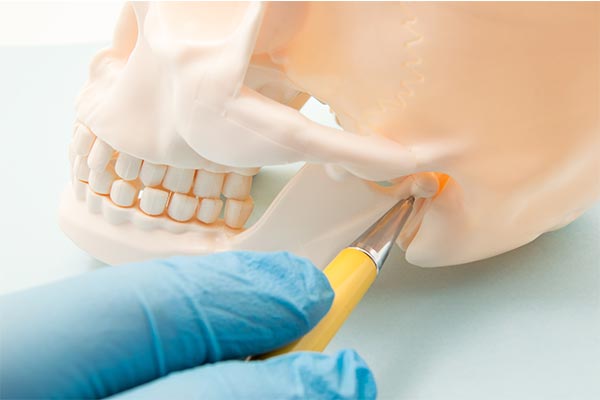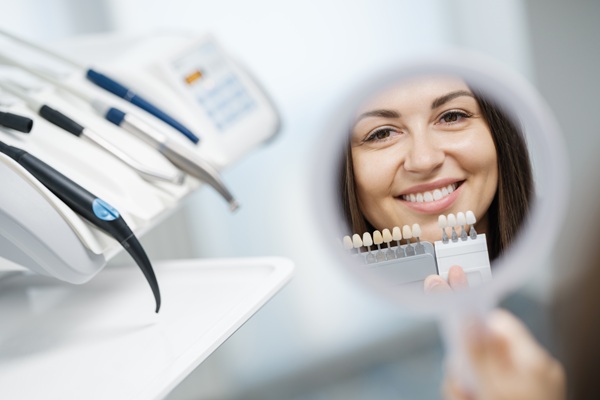 Patients who experience clicking or popping in the temporomandibular joint may have developed the combined jaw joint and facial muscle dysfunction referred to as TMJ disorder. Patients who are female, deal with stress or anxiety, or have other health conditions that affect the muscles and joints may warrant an evaluation. Because TMJ can be a medical problem, a dental problem, or a combination of both, it is beneficial to understand what is causing the patient’s disorder before creating a treatment plan.
Patients who experience clicking or popping in the temporomandibular joint may have developed the combined jaw joint and facial muscle dysfunction referred to as TMJ disorder. Patients who are female, deal with stress or anxiety, or have other health conditions that affect the muscles and joints may warrant an evaluation. Because TMJ can be a medical problem, a dental problem, or a combination of both, it is beneficial to understand what is causing the patient’s disorder before creating a treatment plan.
TMJ as a medical problem
Patients who develop TMJ may wonder which provider to contact for treatment. The condition can be a medical problem due to certain diseases that cause pain in the facial area or inflammation in the jaw joint itself.
Medical conditions that cause TMJ pain
Fibromyalgia is a top contender for medically related TMJ pain. This condition causes widespread pain throughout the body as well as at several “trigger points,” one of which is commonly located in the jaw or upper neck area. Fibromyalgia can cause such symptoms in patients without preexisting dental conditions.
Rheumatoid arthritis and other types of inflammatory arthritis can affect the temporomandibular joint directly. These patients, like individuals with fibromyalgia, may not have any problems with the teeth or mouth; the jaw joint could simply be swollen as a result of an autoimmune attack on its lining.
Medical treatments for TMJ pain
Medically based treatments often begin conservatively and can be prescribed by a medical doctor or a dentist. For joint inflammation, a provider may prescribe pain medication as a first-line treatment. For conditions like fibromyalgia that sometimes respond to antidepressants, massage therapy, and bodily relaxation, alternative treatments may be combined with medications for holistic TMJ relief.
TMJ as a dental problem
Dentists know a great deal about TMJ even if the underlying condition causing it is not related to the mouth or teeth. If the patient’s condition originates from a dental concern, a dentist is the right provider to both diagnose it and form a treatment plan for the patient.
Dental problems that cause TMJ pain
A dentist may perform X-rays or a CT scan of the patient’s mouth and jaw structures to determine the cause of the pain. Bruxism can cause muscular pain in the TMJ area, but thankfully, this painful muscular tension does not result in the joint being damaged. If the patient has undergone substandard dental work in the past, such as ill-fitting braces, this can also result in discomfort in the jaw joint.
Dental treatments for TMJ pain
Occlusal splints, or nightguards that prevent the teeth from locking together, are a first-line treatment for TMJ that does not have a disease origin. If the patient bruxes due to stress, a nightguard may help. Medication such as antidepressants, anti-anxiety medicine, and NSAIDS may be prescribed on a case-by-case basis.
Conclusion
The medical and dental treatments of TMJ often overlap. Because treatment is a collaborative process between the dentist and the patient, it is recommended to find a practitioner who is detail-oriented and knowledgeable about different subtypes of temporomandibular joint dysfunction.
Request an appointment or call Complete Dental at 559-448-9000 for an appointment in our Fresno office.
Related Posts
Jaw pain is usually symptomized by throbbing pain. It can start abruptly, or mildly at first and worsen over time. Regardless, the symptoms depend on the origin of the pain. Knowing the causative agent is the first course of action in treating this condition. One of the most common causes of jaw pain is misaligned…
Disorder of the temporomandibular joint, or TMJ, is a condition that can cause difficulty with jaw functions. The disorder can cause jaw pain that restricts how you open and close your mouth. You might notice clicking sounds or jaw locking when eating, talking or yawning. Continue reading to learn more about the symptoms, diagnosis and…
In the dental community, TMJ disorders are a relatively common issue. Many adults experience the telltale signs of jaw problems at some point in time. These can include:InflammationPain or sorenessTension and stiffnessClicking/popping when opening or closing the mouthTrouble opening the mouth fullyFor some people, TMJ disorder is a serious, chronic problem that requires medical intervention.…


